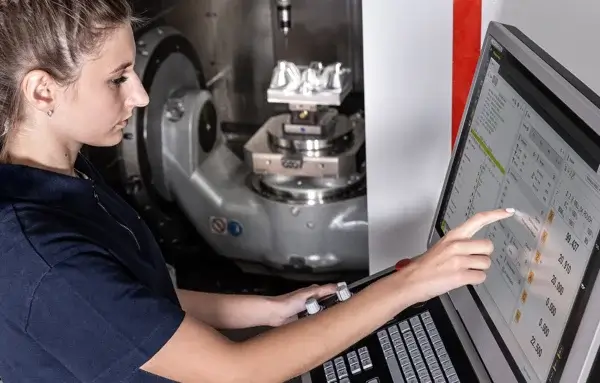The sustainability of our products
HEIDENHAIN encoders and controls promote greener manufacturing. Our products have always been designed to increase the efficiency and performance of our customers’ machines and processes on the one hand and to advance sustainability and eco-friendly operation on the other. That’s why HEIDENHAIN products are not wear parts. They’re designed for the entire life cycle of a machine. Our latest encoder and control generations even help our customers reach their own sustainability goals.
Reduce your CO2 footprint and system costs, boost process reliability
with HEIDENHAIN encoders
Manufacturing high-accuracy products on machine tools requires precise motion and position control of the machine table that moves the workpiece and of the spindle that holds the tool. HEIDENHAIN makes this feat possible through the position feedback of its angle and linear encoders.
Due to cooling lubricant in the machine envelope, these encoders need to operate reliably in the face of significant liquid contamination. Thanks to improved optics that reduce diffraction and diffusion, next-generation HEIDENHAIN linear and angle encoders ensure accurate scale readings despite condensation and droplet contamination. As a result, they don’t need purge air in order to reliably provide high-accuracy position feedback.

Benefits for OEMs
Machine manufacturers can greatly simplify their compressed air systems and forgo extra filters. In many cases, the encoders require no compressed air at all, thus reducing their carbon footprint by up to 99% during operation and lowering the system costs required for providing compressed air.
Benefits for users
- Less energy consumption due to less compressed air
- Lower operating costs due to less maintenance of the compressed air system
- Improved process reliability due to higher encoder availability, even without compressed air
It takes optimized sensor optics, a HEIDENHAIN-developed scanning ASIC and precision components to ensure an unhindered view of the graduation. This eliminates the need for purge air and reduces the CO2 footprint.
HEIDENHAIN controls improve energy efficiency by decreasing machine idle time while increasing zero-scrap productivity

The technologies we develop for our controls significantly reduce machining time and allow more parts to be machined faster with process reliability.
Special functions for automated processes make it possible to plan jobs for unattended shifts and to orchestrate seamless job sequences without interruptions, all ahead of time on the control. Since this enables perfectly machined parts starting with a batch size of 1, scrap and rework are reduced. This saves time, resources and energy, resulting in highly effective environmental stewardship.
Reducing non-productive time has great potential to increase the energy efficiency of a machine tool. After all, during non-productive periods, machine tools still consume more than 50% of the power they use during machining.
Reducing machine idle time
The 6D setup options for the new TNC7 control make it possible for users to probe workpieces and fixtures up to five times faster. This adds up to considerable time and energy savings. And during automatic machine setup and in-process inspection for serial production, our touch probes deliver speed gains of up to one second per probing cycle.
Predicting process interruptions
The TNC7 delivers extensive simulation features and thorough process and component monitoring functions that increase the process reliability of machine tools. Inside the work envelope, our sensors and vision systems, meanwhile, can inspect tools merely in passing, saving up to six seconds per inspection compared with conventional laser systems.
Although responsible for only around 20% of a machine tool’s total energy consumption, the components of HEIDENHAIN control systems can significantly contribute to energy efficiency and greatly reduce the energy required per part.

